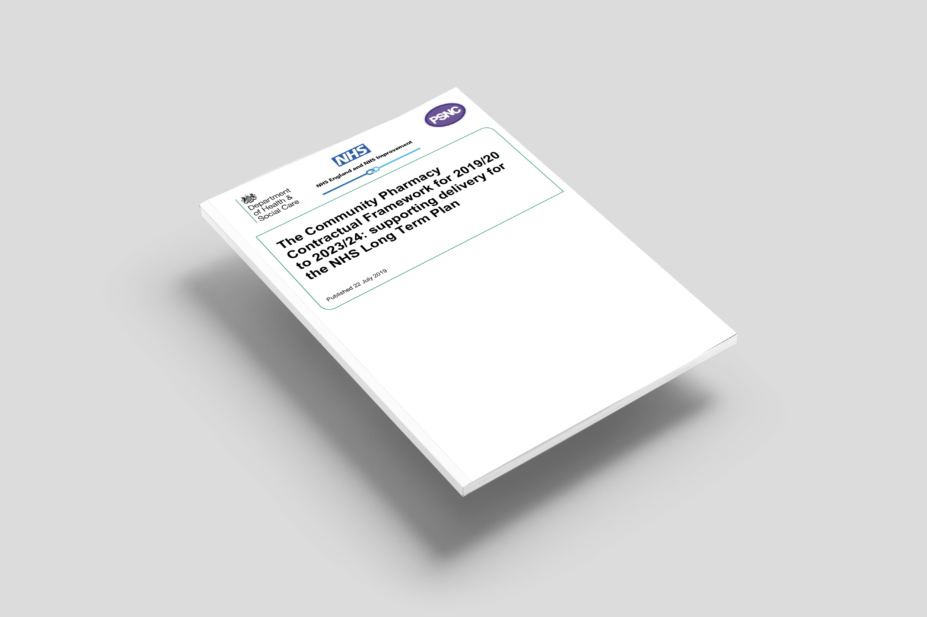
JL / The Pharmaceutical Journal
The government was warned that some pharmacies could “become financially unviable and close” because of cost pressures related to launching new services under the five-year community pharmacy contract, a freedom of information request from The Pharmaceutical Journal has revealed.
An impact assessment for the ‘Community Pharmacy Contractual Framework for 2019/20 to 2023/24’ (CPCF) was dated 11 July 2019 — shortly before publication of the full framework — and describes how the deal would “create winners and losers across pharmacy contractors”.
Negotiators for the community pharmacy sector said the assessment had been written after the agreement of the CPCF deal with the Pharmaceutical Services Negotiating Committee (PSNC), and called the assessment “misleading” for comparing “the impact of the five-year deal with a ‘no change’ option” that had not been tabled during negotiations.
The contract framework for 2019/2020 to 2023/2024, published on 22 July 2019, outlined government plans to introduce more clinical services in the community pharmacy setting, while maintaining flat funding of £2.592bn per year for five years.
The impact assessment for the deal, which was obtained by The Pharmaceutical Journal through a freedom of information request, says that the costs of delivering “new services introduced under the policy are offset by the costs of the services being phased out”.
“However, there is a risk that the introduction of new services or other requirements, or changes in prevailing market conditions during the five-year deal, could result in additional cost pressures arising,” the assessment adds.
In analysing the impact of these cost pressures, the assessment concludes that “as cost pressures increase, the current market environment may mean that some community pharmacies change their cost-structure or business model”.
“In some circumstances this could mean pharmacies in certain locations become financially unviable and close,” the assessment says.
It warned that the contract “could lead to there being significant changes in the distribution of funding across pharmacies, creating a large number of winners and losers from the proposals”.
This could “have significant financial impacts for community pharmacy,” the assessment found.
While the document says there is “no reliable way of estimating the number of pharmacies that may close as a result of the increasing cost pressures,” a table included in the assessment compared the proposed contract funding with baseline income distribution by pharmacy size.
It found that some of the smallest pharmacies could see up to a 2% decline in funding, while the largest pharmacies would see their funding increase by up to 1.2%.
“What we now see in black and white is that the government knew from the start that the real-terms funding cut in the five-year contractual framework risks uncontrolled closures,” said a spokesperson from the National Pharmacy Association.
“That was before the extra cost pressures of COVID-19 could be factored in. The health secretary has since said that he is against closures as a matter of policy. His public support for pharmacies urgently needs to translate into a level of investment sufficient to underpin viability and patient care in our chronically undervalued sector.”
The impact assessment adds that the Department of Health and Social Care (DHSC) was “alert to the potential cumulative impact of the five-year deal at flat £2.592bn, on top of the funding cuts introduced in 2016, as well as subsequent activity to reduce drug reimbursement prices (of Category M generic medicines) to recover a substantial over-delivery of margin in 2015/16 and 2016/17” at the time.
“In instances where businesses may have dipped into their reserves and/or made non-recurrent savings, such as reducing discretionary additional service provision or staffing levels, some contractors may be unable to make further efficiencies in the context of a flat cash settlement,” the document says.
The government said in the assessment that 154 net closures had occurred between June 2017 and March 2019, with “some” of these posing a risk to patient access.
The Pharmaceutical Journal revealed in September 2020 that the community pharmacy sector had seen a net closure of 136 pharmacies in the first eight months of 2020.
Simon Dukes, chief executive of the PSNC, said the impact assessment “was written after the agreement of the deal with PSNC — it had no bearing on PSNC’s decision to accept the five-year deal”.
He added that the PSNC “particularly objects to the suggestion that the transitional payment has helped to alleviate contractors’ costs — this could never have been the case without any increase to the global sum.”
“It is also misleading to compare the impact of the five-year deal with a ‘no change’ option. This option was simply not on the table during the negotiations — PSNC’s negotiating team was left in no doubt that had the sector not agreed to a new and ambitious vision for community pharmacy services, further funding cuts would have followed to deliver the efficiency squeezes that the NHS was determined to impose on the sector.”
Dukes said that the PSNC carefully considered the impact of the CPCF deal on community pharmacies, with the majority of the committee accepting it “on the basis that it provided financial certainty for contractors by protecting base line funding for the sector for five years”.
The DHSC said the assessment displays the government’s early thinking and was developed to support ministers’ decisions on the direction of travel set out in the five-year deal.
It added that the document is a framework for developing policies and contains broad assumptions on how the framework could develop.


